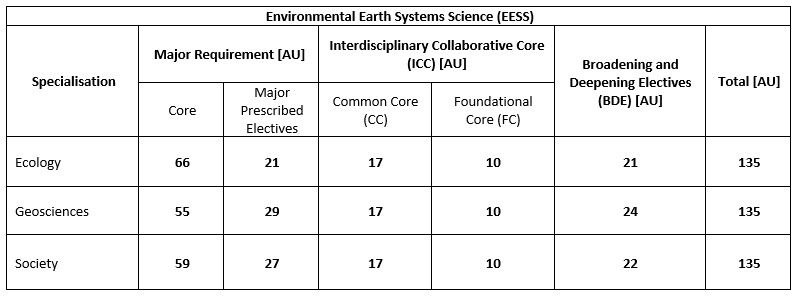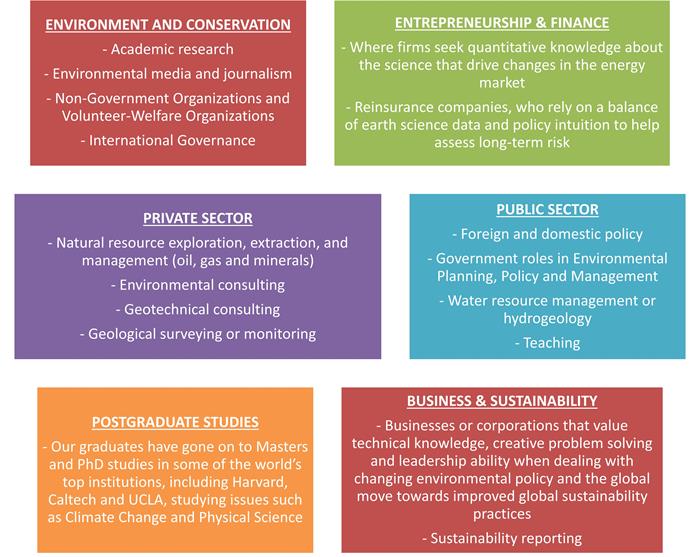Bachelor of Science (Honours) in Environmental Earth Systems Science (EESS)

The Environment Earth Systems Science programme favors a small cohort which encourages an innovative and interactive learning environment. Students who choose this course will gain a strong background in quantitative skills such as spatial analysis, core science and modern computing techniques. We also place emphasis on applying these skills through critical thinking, communication and collaboration.
Admission Requirements
The Bachelor of Science in Environmental Earth Systems Science programme accepts ‘A’ Level, IB, NUSHS Diploma, Polytechnic Diploma and other equivalent international qualifications on a selective basis. All candidates with strong academic potential who satisfy minimum subject requirements as well as the general admission requirements set by NTU will be considered.
A-Level Students:
- H1 Level Pass in Mathematics AND
- H2 Level Pass in Physics/Chemistry/Biology/Economics/Computing
IB Diploma Students:
- Mathematics at Standard Level AND
- Physics/Chemistry/Biology/Economics/Computer Science at Higher Level
International and Other Qualifications:
- Additional Mathematics at Junior High School and equivalent AND
- Physics/Chemistry/Biology/Economics at Senior High School
NUS High School Diploma:
- Major CAP of 2.0 in Mathematics AND
- Major CAP of 2.0 in Physics/Chemistry/Biology
Polytechnic Diploma:
- Please visit us on the web to learn which polytechnic diplomas are eligible for our programme
Curriculum
Ecology and Ecosystems
Students who choose the Ecology Specialisation will take an expanded group of courses in biology and ecology to learn more about the biological and environmental aspects of life on Earth. Students who complete this specialisation may choose careers in NGOs that work in Singapore and the region, government agencies, biotechnology firms, and research. Please note that this specialisation requires chemistry courses at NTU that have a prerequisite of H2 Chemistry in A-levels. You may be able to enroll in these required courses without the prerequisites, but these courses may be difficult for you without this background. Please contact us if you have questions regarding your ability to join this specialisation.
Click here to view the curriculum.
Geosciences
This specialisation focuses on study of the solid Earth, including its composition, structure, and how topography and sedimentary, igneous, and metamorphic rocks at the Earth’s surface reflect Earth processes. The Geosciences specialisation includes coursework designed to prepare students for careers in geotechnical and environmental consulting, and natural resource exploration and management. Students are also prepared for graduate study in the geological sciences.
Click here to view the curriculum.
Society and the Earth System
The Society and the Earth System specialisation includes interdisciplinary coursework in sociology, economics, and law in addition to core classes in Earth and environmental sciences. This gives students a unique understanding of how humans relate to the environment, and the complex issues of sustainable societies. Students who choose this specialisation will be prepared for careers in environmental planning, policy, and management, and even careers in business, finance, and government. Students will also be prepared to continue their studies in graduate programmes in urban planning and development, environmental/public policy, or business.
Click here to view the curriculum.

Career Prospects
Our graduates are prepared with diverse skill-sets and knowledge to fill a wide array of both public and private sector positions, or to pursue graduate programmes. Our graduates have job opportunities in Singapore, Southeast Asia, and overseas, and are prepared to tackle the environmental challenges of the 21st Century.
Possible career options:

FAQs
What's this E2S2 programme about?
Environmental Earth Systems Science (E2S2) uses science – chemistry, biology, and physics as a background to study the Earth and environment.
There are three specialisations within this programme, namely Geosciences, Society and the Earth System and Ecology and Ecosystems. Geosciences mostly focus on the solid Earth; with this degree, you could embark on your career in environmental or geotechnical consulting, look for natural resources, or do other jobs. Society and the Earth System focuses on how humans interact with the environment, so students who take this specialisation take courses in economics, urban planning, and others on how humans relate to the environment. Students in this specialisation may go on to jobs in government planning, business, or environmental organisations. The Ecology specialisation focuses on the biological and environmental aspects of life on Earth. Students who complete this specialisation may choose careers in NGOs, environmental consulting, government agencies, biotechnology firms, and research.
The Asian School of the Environment (ASE) admits up to 50-60 students per year, as we offer a field course after the first year, where all students will spend 2 weeks working on environmental problems in Bali.
There are other opportunities for field courses. We also encourage students to conduct a semester of study at another university. In their final year, students can choose to do a final year research project in close collaboration with a faculty member.
How is this programme different from Engineering?
Instead of focusing on engineering solutions, environmental earth systems scientists view problems more holistically as a scientist. For instance, flooding on Orchard Road is more than an engineering problem. Environmental Earth system scientists look at the subsurface and the urban landscape to understand the root causes of problems. They collaborate with engineers and city planners to generate solutions that work.
How is this programme different from Geography or Environmental Studies?
In our programme, you may study similar issues to students who major in geography or environmental studies. One of the main differences in our programmes is that we use quantitative techniques, based on a background in maths and sciences, for these studies. We believe that employers will value your quantitative background when you are looking for jobs. This skill set will also allow you to work with engineers, city planners, and others to generate sophisticated solutions to complex questions.
How do I get accepted?
We admit 50-60 students or less each year into ASE, depending on the number of applicants. Admission is based on A-Levels/Poly/IB results and an in-person interview (refer to the Admissions page for details). We occasionally admit students with exceptional alternative backgrounds that are relevant to the programme.
I really like this programme, but I am worried about the admission process. Should I apply?
If you feel strongly that this is the right programme for you, we encourage you to apply. We have included the interview in the student selection process because we want to ensure that the students in the programme are passionate about the Earth and the environment. If you are concerned about your academic background, we encourage you to prepare for the interview. With this, you will be able to convey to the panel your passion for the programme and other qualities that you possess that make you a strong candidate.
Do I need to have a science background to get accepted?
Ideally, students who apply would have a solid background in maths and sciences as these are part of the programme. However, if you are a strong student and are interested in the programme, we encourage you to apply.
We want you to be prepared – the course will be challenging if you do not have a background in maths and sciences. Officially, some of the core courses require A level or H2 level maths or equivalent as prerequisites. Although students do enrol in these courses who do not meet these requirements, this does mean that these courses would likely be challenging for you and would require significant effort. Nevertheless, NTU offers resources for students who require help, and it will be important to line up a study group and these types of resources before you begin the courses. Hopefully, other students in the E2S2 programme could also be a good resource for you. Through our major advising programme, we will help you to structure your studies, so your maths and sciences are spread out, and you will not be too overwhelmed.
If you want to take on these challenges, you will have to be ready in the interview to convince us that you have thought through these challenges and are prepared to meet them.
Do I need to have a geography background to get accepted to the major?
The programme covers similar topics to geography, but to us, the maths and sciences background is more important than a background in geography. However, your geography studies are a great way to demonstrate an interest in our type of programme, and your enthusiasm for geography may help you express why you are interested in the E2S2 programme in your interview.
What will the interview be like?
We encourage you to look forward to your interview experience. It is a chance for you to understand our programme better and for you to highlight the qualities that make you competitive for admission. Before your interview, you will be placed in a group with other students and will have a chance to learn more about the programme, take a quick tour of our facilities, and ask any questions you’d like before your interview. For the interview, you will meet with a panel of our faculty. The purpose of the interview is for us to get to know you better, so most questions will probably centre on your interests, goals, and strengths. Before the interview, we suggest that you think about what you’d like to highlight to us in your interview, but don’t worry about preparing too much.
I am interested in transferring to this programme from another. Is it possible?
Yes! We welcome students from other disciplines who think they are more suited to the Environmental Earth Systems Science programme. Depending on the courses you have already taken at university, it may be possible to finish your studies in three years. However, we suggest that you plan to take four years to complete the programme to take full advantage of opportunities in the field, study abroad, and conduct an internship or senior research project. Please note that the programme remains selective for transfer students. Our advice is to keep your grades up as much as possible in your current major programme. If you demonstrate that you can succeed at university, you will have a better chance of being admitted to our programme.
Once you are ready to transfer programmes, please visit the Change of Programme website to learn more. Please work with Academic Services and the Undergraduate Academic Officer to coordinate the timing of your application. For us, it is often best if the Change of Programme applications come during the application period for Poly and A-level students.

